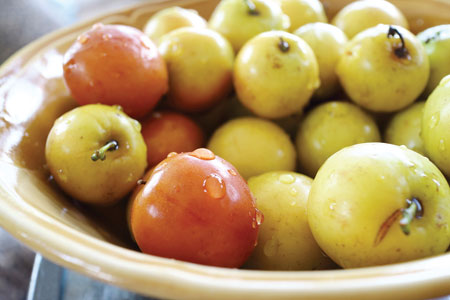AGRICULTURE
As the season of jujube (Ziziphus jujube) comes close to its end in March, producers look optimistic, and believe this year has been beneficial for the otherwise ignored fruit.
 Approximately 7,000 to 10,000 bags, comprising 25 kilogram each, go daily to Peshawar and Mardan markets only from Tandojam, Tando Qaisar, and other areas of Hyderabad district.
Approximately 7,000 to 10,000 bags, comprising 25 kilogram each, go daily to Peshawar and Mardan markets only from Tandojam, Tando Qaisar, and other areas of Hyderabad district.
The growers of jujube consider Peshawar and Mardan, two major cities in the province of Khyber Pakhtunkhwa as potential markets of the fruit.
Hassan Nasir Nizamani produces around 3,000 bags daily for the market. About Karachi and Hyderabad cities, he said these were smaller markets, and demanded around 500 to 700 bags each, daily. “Since the production is a lot more, the fruit is sent to Mardan and Peshawar as well, where it has a lot more demand compared to the two large cities of Sindh,” he said.
He takes over jujube gardens on contractual basis for one to five years in various areas. He said jujube was a neglected fruit on government level. “The government has never taken any initiative to look at the jujube market abroad and encourage producers by offering better incentives,” he added.
This fruit produced in Sindh has quality, taste, sweetness, aroma, and medicinal value. Despite the fact it has a potential for export, it is considered only for local consumption.
According to Hassan Nasir, only a few people from Peshawar used to export to Afghanistan, but presently political instability has spoiled this business as well.
"We know that this product has an attractive market in Iran, Turkey, Dubai, and other countries. But it seems there are policy gaps and ignorance to promote this valuable fruit, which can benefit the people associated with this business," Hassan said.
The government and private institutes have taken up all other fruits for promotion at various levels, so, why have they not take up jujube as well for this purpose, he asked.
As he spoke, a truck was waiting to be loaded at the site near Tandojam town. More than two dozen male workers were sorting out quality product for major markets. They all have their contribution in this fruit business. The workers said they all came to the field early in the morning and stayed at work till sunset.
A truck takes Rs70,000 to Rs75,000 fare for the Khyber Pakhtunkhwa markets, which the producers bear, because they do not have any other option to sell.
Hassan is a graduate from Mehran University of Engineer and Technology (MUET). According to him, he did not see any attraction in the job market and hence took over the family business about 18 years ago.
Since then he has been taking mango orchards and jujube gardens on contractual basis, hiring the required workforce, and making a better livelihood. He advises the degree-holder cadre to take lead in personal business, which may be more lucrative than waiting for a long time and hunting for jobs.
Jujube business starts in December and ends in March. The work ranges from watering, taking care of trees, management of entire process, picking, collecting, packing, and loading, all of which need workers for four to six months on monthly and daily wages. There has been a traditional practice of producing, picking, collecting, and packaging.
 Producers do not have exact data of production and workforce employed in this business, but they say it has more potential and engages hundreds of workers, both male and female, in producing areas.
Producers do not have exact data of production and workforce employed in this business, but they say it has more potential and engages hundreds of workers, both male and female, in producing areas.
Dr Imtiaz Nizamani, a PhD in this fruit, who teaches at the Sindh Agriculture University Tandojam, said ber (jujube) has its quality to sustain for a week without any artificial cold. Neither does it need cold warehouse for traders nor does it need any refrigerator at domestic level for protection. This fruit can be kept safe and preserved with the exact taste, colour, and natural aroma for many days without any artificial assistance.
Dr Imtiaz himself is a leading producer of jujube and mangoes. He said, “There is no comparison of ber with mango. Both the fruits have their own qualities and attraction. Ber has its importance as a food with rich nutrients and medicinal value.”
Indigenous varieties
About indigenous varieties like Sufi, Kherol and others, the producers said they were late varieties which started from December and continued till March end. They also said the old varieties were vulnerable to pest attacks, and producers always faced losses. This was one reason it was more lucrative to adopt new varieties in the local environment.
Jujube tree is hard, drought-resistant and can survive insect attacks, and climate change. Golo is a different variety of jujube, which had come here almost 15 years ago, first in Tando Qaisar, Hyderabad district.
As its success rate grew, this variety was adopted by all the producers on priority to replace the old trees. It is an early variety and comes in the market in December and continues till the end of March. Now there are around four famous varieties of only Golo.
Jujube birds
Golo varieties have a different taste, sweetness, juice, and colour. The producers believe that climate change may have horrible impacts on ber-friendly parrot, bulbul, and other birds.
Senior workers recall flocks of parrots, bulbul and other birds coming in jujube season some years back, but now these birds seem to have disappeared. The growers say it is because of the lack of visibility which has deteriorated over time.
This fruit is known by a variety of names in different languages and countries. Producers may have different mechanisms to extract juice for different purposes, depending on their own traditional and commercial practices.
Plantation mechanism
About jujube garden development, growers say they plant 50 to 55 trees per acre, keeping a 25 foot distance among plants. A plant takes at least three years to begin production. In many situations, the tree can survive on soils where other fruit trees cannot. The production starts in December and ends in March. It needs cold winds to mature and ripe.
After the season ends in March, they chop the braches to allow the tree to grow new leaves. It is a common practice to keep the jujube gardens safe. They have a watering system, they use cow manure as fertiliser, and spray for pesticides to protect the trees from insects.
The ber growing areas include Hyderabad, Matiari, Sanghar, Mirpurkhas, Tando Allahyar, and parts of Jamshoro and Larkana districts. But the contractors and managers mostly belong to Hyderabad district.
The producers have pointed out that sometimes greedy people looking to make price value, hurriedly pick the immature product, which usually harms the entire market. “We have learned lessons in the past and always keep an eye over the changes in the markets,” they said.
The writer is a staff member